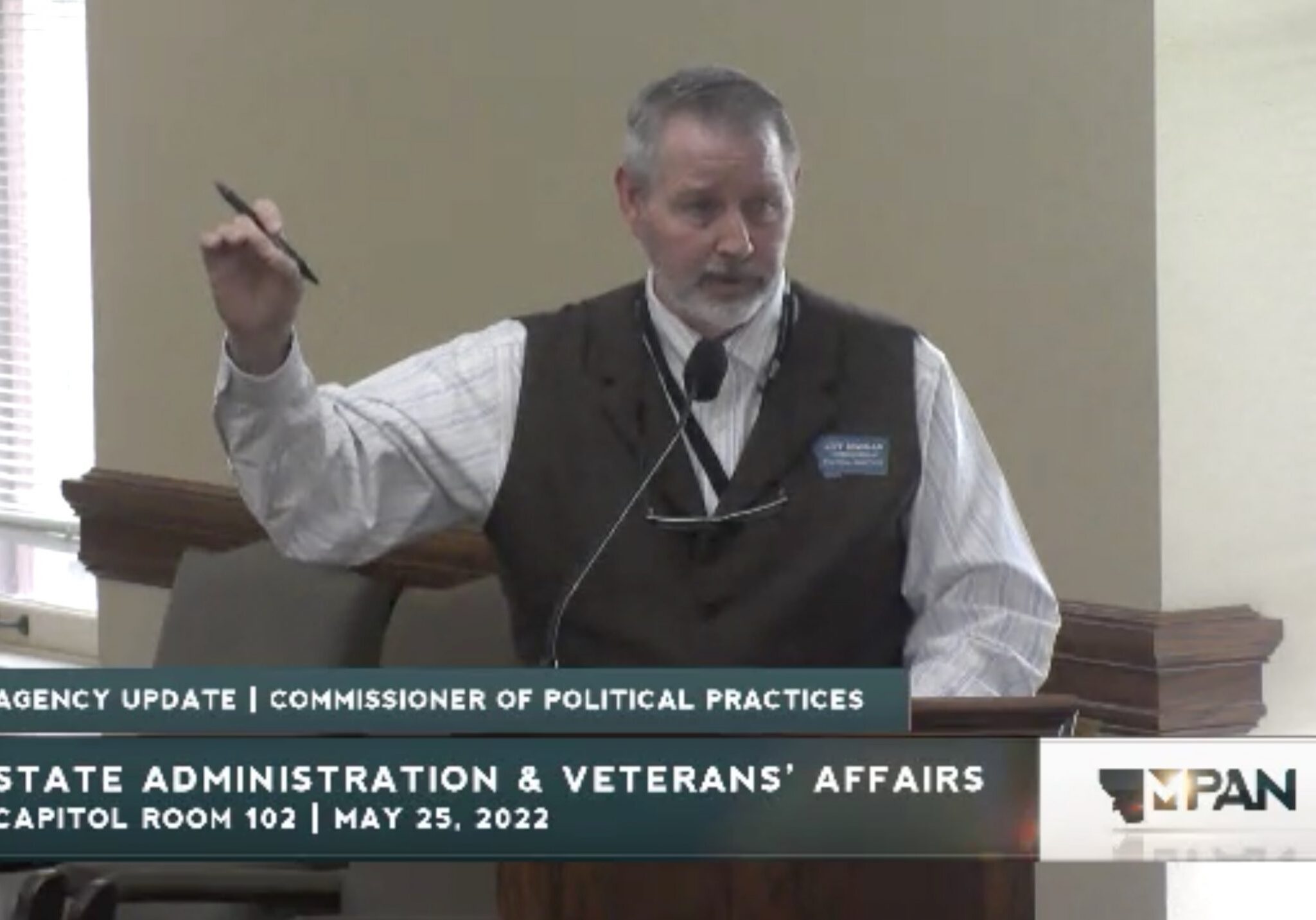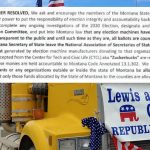Montana Citizens Receive “DOJ Threat” Treatment From Montana Officials Over Election Integrity Concerns
Election officials in Montana have been coordinating with State agencies including the Office of Political Practices (OPP), local law enforcement, and private non-governmental associations to quell citizens who have questions about their local election processes. The moves from state and local officials mirror coordination between the Department of Justice and the National School Board Association…
By Roy McKenzie
May 30, 2022
Election officials in Montana have been coordinating with State agencies including the Office of Political Practices (OPP), local law enforcement, and private non-governmental associations to quell citizens who have questions about their local election processes. The moves from state and local officials mirror coordination between the Department of Justice and the National School Board Association who worked to target concerned parents attending school board meetings late last year.
Commissioner for the OPP, Jeff Mangan, said during an agency update to the State Administration legislative committee Wednesday, May 25th, that questions about the integrity of Montana elections are “harming and putting at risk” elections officials. Mangan asked the committee to consider legislation to expand the definition of “official” in criminal provisions for state elections to include election administrators and election judges. The provision levies fines and imprisonment for any person who “interferes” with an officer holding an election. The proposed expanded language from the OPP could be used to target individual Montanans who have questions about their elections.
The OPP Commissioner admitted during his update to coordinating with local law enforcement and election officials to standup a shadow team dedicated to countering what he defines as “election misinformation” with echoes of the Biden Administration’s Department of Homeland Security “Disinformation Governance Board.” Mangan said that Montana Sheriffs and Peace Officer Association, the Montana County Attorneys’ Association, and law enforcement, have been “very receptive” to planning and working with each other on “election safety and security” and “election misinformation.”
Western Montana News asked the Office of Political Practices for details about their coordination with law enforcement and NGOs regarding “election misinformation,” but an immediate response was not provided.
In an email read by Mangan to the committee from Carbon County Elections Administrator Crystal Roascio, Roascio stated that election judges were quitting because they were “terrified”. Roascio also said that Carbon County Sheriff Josh McQuillan agreed that deputies should be deployed to polling locations during the upcoming primary.
In a follow-up question to commissioner Mangan, Senator Doug Karry asked if there were any documented threats, or any charges filed against citizens for threats against election officials. Mangan could not cite any specific credible threats to any election official in the state or any charges against citizens. Carbon County Sheriff McQuillan admitted to state news outlets that he had not received any official complaints regarding threats to election officials.
Senator Mike Cuffe also asked a follow-up question noting that Mangan used the word “threat” several times during his speech and that the term is loaded. Cuffe asked Mangan if the threats were of physical violence or of disrupting the process or if they were “general rhetoric.” Mangan said, “I’m not being rhetorical. A threat is a threat. Threat is in the eye of the beholder.”
In a thin attempt to support his claim of threats to elections officials, Mangan referenced an incident in Carbon County that occurred around the same time he delivered his speech Wednesday.
“It just happened,” Mangan said to the committee. “Right now in Carbon County they’re doing an elections tabulation test on the machine and they had to have a deputy there.”
Carbon County broken tamper-proof seals
Carbon County Clerk & Recorder Christine Stovall had the sheriff and the police department called during a second public demonstration of the county’s two ES&S DS200 election tabulation machines that were found to have broken tamper-proof warranty seals in a prior public demonstration on May 12th.

Initially, election officials including Roascio and the Secretary of State’s office said the broken tamper-proof seals were due to rubbing of the machine struts across the seals, but Elections Administrator Roascio contacted Todd Case, the ES&S tech who maintains the state’s tabulation machines, who told her that he had opened the device just after they were installed in Carbon County prior to the 2020 Primary to make an “altitude adjustment” to the device’s scanner board. Case told Roascio that he “didn’t even think” to replace the broken seals.
The machines with the broken seals were used in the 2020 Primary, 2020 General Election, the August 2021 Jail Bond Special Election, November 2021 municipal elections, and are set to be used in the 2022 Primary to be held June 7th.
Roascio shared with observers that Case told her DS200 devices in other counties had trouble with the thickness of the ballot “at elevation” which necessitated the adjustment, but admitted that she did not know which other counties Case was referring to.
After the breached seals were found, Roascio was offered new machines by ES&S, but declined opting to perform another public demonstration of the machines which she said served to “certify” the machines.
At the second public demonstration, Red Lodge resident Lisa Bennett requested information on what technician Case did to the DS200 tabulation machines to evaluate them prior to their use in the second demonstration. Roascio told observers that Case had replaced the tamper-proof seals with “stickers” and said the technician did not open the device to check its internal components. Bennett pressed to find out if there was an official process for the ES&S technician in evaluating machines but was rebuffed by Clerk Stovall who said that Bennett would have to “do a FOIA” to get that information.

Because Bennett was told by election officials that the “altitude adjustment” was related to the operation of the machine’s ballot feed tray, Bennett asked elections staff if they would run a photocopied ballot through the DS200 tabulation machines to test whether the machines would count a non-official ballot on thinner paper. That is when County Clerk Stovall shouted, “Call the Sheriff.” An officer and Sheriff McQuillan arrived shortly after but did not enter the demonstration area.
Bennett said she and others would have felt rest assured that the tabulation machine would reject non-official ballots if the clerk would have included a photocopied ballot in their test deck of ballots.
“Concerned citizens just want complete transparency and if elections officials don’t have the answer, we are not going to beat them up. We just want them to find the answer and get back to us, not treat us like criminals,” Bennett said.
Altitude adjustment: “No! Why would air pressure matter?”
In an effort to get clarity regarding the “altitude adjustment” made by Case to the tabulation machines, Lisa Bennett’s husband, Chip Bennett, a computer consultant with nearly 40 years of experience in the industry, called the ES&S tech help line on May 19th at around 3:30pm after scouring ES&S manuals for the DS200 and not finding reference to the “altitude adjustment.”
Chip asked Jeremy, a support technician who answered, “Is there an altitude compensation adjustment for the ES&S DS200?” According to Bennett, the ES&S support tech said emphatically, “No! Why would air pressure matter?” Jeremy then asked Bennett who he was. Bennett said that he was just a concerned citizen and the call ended abruptly after.
Unanswered questions
Over the past two years, groups like the Montana Election Integrity Project, the Missoula County Election Integrity Project, and individual citizens across the state of Montana have asked for data and information related to their elections processes. Most citizen requests have been met with hostility, demands for public records requests which go unanswered, or simply silence from elections administrators and the Secretary of State.
Frustrated citizens have sought answers and information related to chain of custody documentation for 2 additional boxes of ballot signature envelopes that were presented by county elections workers during a recount held in Missoula County in late March. Now, in Carbon County, where election officials continue to use the Montana Public Records Act as a shield to hide from questions and from providing documentation, elections officials are demanding citizens submit questions about broken device seals, election processes, and tabulation device certification and maintenance via public records requests which have gone unanswered.
While legitimate questions from constituents go unanswered, the state’s election officials, law enforcement, bureaucratic agencies, and non-governmental organizations see citizens as hostile actors who need to be reined in and who election officials need to be protected from. The silence, misdirection, and lack of transparency from officials to citizens inquiries has created the climate of distrust Commissioner Mangan blames on citizens and will only get worse as the state apparatus builds a wall separating the two.
Don’t miss the week’s top Montana stories
Join readers across Montana who rely on WMN for independent reporting.
Unsubscribe anytime. Want to support WMN? Upgrade for $4/month →






Mangan should be removed from his post. Instead of trying to deflect he should answer the questions and have a public demonstration of the machines to calm things down. He didn’t….although this is three years old when I am reading it right now, thee is NO excuse for this Mangan to behave like he did.
Roy, thanks for the info. I would have thought our Sheriff’s would be less “progressive” than to immediately jump to the conclusion that questioning possible election machine tampering was a subversive, or threatening, act. I’ve only lived here for ten years (and bought a home in 2013), but I was hoping most Montana Sheriff’s Departments were more open and honest. I was a San Diego PD peace officer as a young man, and put in over ten years with the California Highway Patrol as well. Obviously I support law enforcement (as peace keepers, not simply the enforcers of law), and it troubles me that Montana law enforcement would behave in that fashion. That needs to be addressed in the voting booth – but on honest machines that haven’t had an “attitude” (not altitude) adjustment.
Thanks for reading, Reg and thank you for your service. We need more transparency, not less. Mangan and state officials in coordination with law enforcement are turning it into a crime.